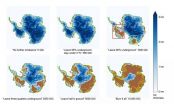(Press-News.org) CORAL GABLES, Fla. (September 11, 2015) -- Researchers from the University of Miami and Harvard University address the challenges of effective universal health coverage in low- and middle-income countries, focusing on solving one of the most pressing issues: the care of chronic illnesses. Their suggestions, aimed at strengthening health care systems, include recommendations based on a "diagonal approach" for managing health care. Their report is published in the September issue of the journal Health Affairs.
The authors shared their findings on Wednesday, September 9, at the educational forum "Ensuring Patient Access in Latin America: Governance, Assessment Methodologies, and Evidence-Informed Decision Making in Health Policy," held in Santiago, Chile, and at the Health Affairs briefing titled "Noncommunicable Diseases: The Growing Burden," in Washington, D.C.
First author of the study, Felicia Marie Knaul, a breast cancer survivor, director of the College of Arts & Sciences' Miami Institute for the Americas, and professor at the Miller School of Medicine at the University of Miami, says her personal experience has taught her the importance of accessing care at all stages of the disease, including survivorship.
"Health systems around the world can and must be transformed to meet the challenge of chronic illness and respond to the needs of patients from prevention to palliation to achieve effective universal health coverage," said Dr. Knaul, who was the director of the Harvard Global Equity Initiative at the time this research was conducted.
Chronic diseases are conditions where ongoing treatment is needed for months or years before the occurrence of death or before being considered no longer at risk of dying from that ailment. They are costly to treat. Proper management involves consideration of each stage of the chronic disease continuum - prevention, early detection, treatment, survivorship, rehabilitation, palliative, and end-of-life care.
Advances in medicine have transformed many terminal diseases into chronic conditions. Moreover, rapidly aging populations impose an increasing burden on already weak systems of health care in low- and middle-income countries.
Typically, health care systems in low- and middle-income countries are designed to treat acute episodes of illnesses and injuries. They are ill prepared to meet the challenge of the rise in chronic diseases. Hence, the paper suggests a need to focus on effective universal health care coverage, to holistically redesign health care systems for care across the life span of a person.
According to the report, there are three basic requirements for achieving universal health coverage: legislation and affiliation to ensure coverage of all people, provision of access to cost-effective health services, and creation of a means of financial protection. Effective universal health coverage adds another additional component - integration of services at each stage of the care continuum and health systems function.
Traditional approaches for health care systems in low- and middle-income countries are inadequate to deal with the shifts in the burden of disease toward noncommunicable and chronic illnesses. The approach has been either vertical strategy--targeting particular diseases, or horizontal strategy--targeting health care systems, hence investing in one disease or stage of care at the cost of neglecting another, the report says.
The diagonal strategy proposed by the authors aims to form synergies between elements of vertical and horizontal approaches, giving precedence to programs that respond to multiple diseases, explained Julio Frenk, president of the University of Miami and co-author of the study. Dr. Frenk was dean of the Harvard T.H. Chan School of Public Health at the time this research was conducted.
"A diagonal approach to health care is an efficient strategy for achieving better results with limited resources," said Dr. Frenk. "It changes the fragmented view of health systems, which focuses on its constituent elements - like human resources, financing, facilities, and technologies - individually, in a sort of 'laundry list' conception, to a new system based on the interrelations among the various components. This concept can help move forward universal health coverage in all countries."
In the report, the researchers present a case study on the management and treatment of breast cancer, as a tracer illness for assessing effective universal health coverage within the context of the 2003 health care reform in Mexico. The case study outlines the shortcomings of the reform in considering stages of the care continuum beyond treatment, such as early detection and palliative care. It then presents diagonal strategies implemented to address these gaps.
The report concludes with a set of recommendations to implement diagonal strategies in the health care systems of low- and middle-income countries, by integrating services and strengthening existing platforms to provide care to individuals, which takes into consideration the needs and potential of the person, throughout her lifetime and across the different stages of disease.
In the future, the researchers would like to develop a more detailed analysis of effective universal health coverage for each stage of breast cancer, beyond early detection and palliation, within the context of health reform in Mexico and in other low- and middle-income countries, in hopes of utilizing this type of health systems analysis as a model for other chronic conditions.
"Along with my co-authors, I plan to continue research around health systems strengthening and chronic disease management, particularly to promote means for improved priority-setting around chronic diseases and to reduce health inequities," said Afsan Bhadelia, visiting scientist at the Harvard T.H. Chan School of Public Health and co-author of the study, who was a research associate at the Harvard Global Equity Initiative at the time this research was conducted.
INFORMATION:
The findings are published in an article titled "Achieving Effective Universal Health Coverage And Diagonal Approaches To Care For Chronic Illnesses." Rifat Atun, professor of global health systems at the Harvard T.H. Chan School of Public Health is also a co-author of the study. The original research was conducted at Harvard University. The work will continue in collaboration with the Miller School of Medicine, Sylvester Comprehensive Cancer Center at the University of Miami Miller School of Medicine, and the Miami Institute for the Americas.
http://www.news.miami.edu
Washington, DC--New work from an international team including Carnegie's Ken Caldeira demonstrates that the planet's remaining fossil fuel resources would be sufficient to melt nearly all of Antarctica if burned, leading to a 50- or 60-meter (160 to 200 foot) rise in sea level. Because so many major cities are at or near sea level, this would put many highly populated areas where more than a billion people live under water, including New York City and Washington, DC. It is published in Science Advances.
"Our findings show that if we do not want to melt Antarctica, we ...
Burning all of the world's available fossil-fuel resources would result in the complete melting of the Antarctic ice sheet, a new study to be published in Science Advances shows. The Antarctic ice masses store water equivalent to more than 50 meters of sea-level rise. The new calculations show that Antarctica's long-term contribution to sea-level rise could likely be restricted to a few meters that could still be manageable, if global warming did not exceed 2 degrees. Crossing this threshold, however, would in the long run destabilize both West and East Antarctica - causing ...
A study conducted by biologists at UC San Diego has found that the Africanized honey bee--an aggressive hybrid of the European honey bee--is continuing to expand its range northward since its introduction into Southern California in 1994.
The study, published in this week's edition of the journal PLOS ONE, found that more than 60 percent of the foraging honey bees in San Diego County are Africanized and that Africanized bees can now be found as far north as California's delta region.
"Our study shows that the large majority of bees one encounters in San Diego County are ...
Scientists have identified an ingeniously elegant brain circuit consisting of just five nerve cells that allows female crickets to automatically identify the chirps of males from the same species through the rhythmic pulses hidden within the mating call.
The circuit uses a time delay mechanism to match the gaps between pulses in a species-specific chirp - gaps of just few milliseconds. The circuit delays a pulse by the exact between-pulse gap, so that, if it coincides with the next pulse coming in, the same species signal is confirmed.
It's one of the first times ...
Researchers from Lund University in Sweden have shown that well-developed eyes come at a surprising cost to other organ systems. The study involving Mexican cavefish shows that the visual system can require between 5% and 15% of an animal's total energy budget.
Researchers have long associated the presence of a well-developed brain with major energy consumption. This means that animals that develop advanced nervous systems require environments where this is possible. There has to be good access to nutrients, and every investment in an organ comes at a cost to some other ...
WASHINGTON (Sept. 11, 2015) - A statement from American College of Cardiology President Kim Allan Williams Sr., M.D., FACC, regarding the National Institutes of Health stopping the SPRINT trial early after demonstrating the positive benefits of lower blood pressure control targets:
"About 70 million American adults have high blood pressure and only half of them have their condition under control. The preliminary data demonstrates why the cardiovascular community must continue to aggressively fight a condition that leads to stroke, kidney disease and heart problems for ...
Washington, DC - September 11, 2015 - Periodontitis is a risk factor for heart disease. Now a team of researchers has shown that a periodontal pathogen causes changes in gene expression that boost inflammation and atherosclerosis in aortic smooth muscle cells. The research is published ahead of print in Infection and Immunity, a journal of the American Society for Microbiology.
The circumstantial evidence that led to this study was ample. The periodontal pathogen, Porphyromonas gingivalis, has also been found in coronary artery plaques of heart attack patients. And in ...
This election year has produced 17 Republican presidential candidates, which on its surface may appear to give the party a competitive advantage. Evolution, however, disagrees.
A new study by Michigan State University researcher Arend Hintze and appearing in the current issue of Scientific Reports, says the delicate balance of some, but not too much, competition optimally drives the evolution of decision-making strategies.
"Competition has a unique relationship with our decision-making strategies as humans," said Hintze, an assistant professor at MSU. "Modest competition ...
An overview of regulatory solutions worldwide on the use of nanotechnology in food and feed production shows a differing approach: only the EU and Switzerland have nano-specific provisions incorporated in existing legislation, whereas other countries count on non-legally binding guidance and standards for industry. Collaboration among countries across the globe is required to share information and ensure protection for people and the environment, according to a JRC co-authored paper.
The paper Regulatory aspects of nanotechnology in the agri/feed/food sector in EU and ...
The list of potential mechanisms that underlie an unusual metal-insulator transition has been narrowed by a team of scientists using a combination of X-ray techniques. This transition has ramifications for material design for electronics and sensors.
The transition between being electrically conductive (metallic) at high temperatures and electrically insulating at lower temperatures is known as a metal-insulator transition (MIT). Pinpointing the activation mechanism that allows crystals used in devices such as transistors in electronics and temperature-based sensor control ...

